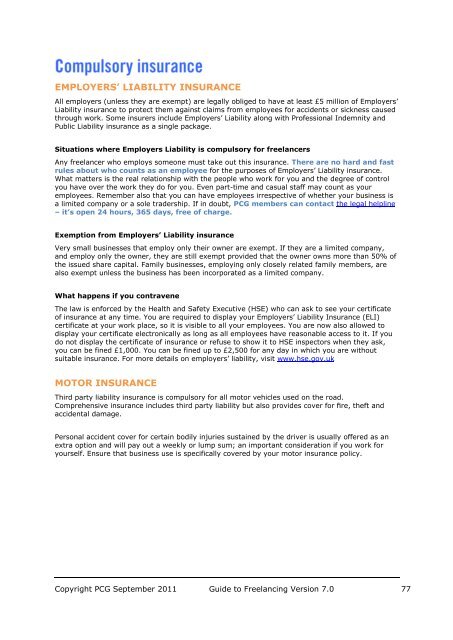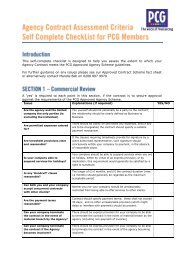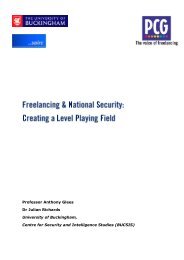Guide to Freelancing - PCG
Guide to Freelancing - PCG
Guide to Freelancing - PCG
You also want an ePaper? Increase the reach of your titles
YUMPU automatically turns print PDFs into web optimized ePapers that Google loves.
EMPLOYERS‟ LIABILITY INSURANCE<br />
All employers (unless they are exempt) are legally obliged <strong>to</strong> have at least £5 million of Employers‟<br />
Liability insurance <strong>to</strong> protect them against claims from employees for accidents or sickness caused<br />
through work. Some insurers include Employers‟ Liability along with Professional Indemnity and<br />
Public Liability insurance as a single package.<br />
Situations where Employers Liability is compulsory for freelancers<br />
Any freelancer who employs someone must take out this insurance. There are no hard and fast<br />
rules about who counts as an employee for the purposes of Employers‟ Liability insurance.<br />
What matters is the real relationship with the people who work for you and the degree of control<br />
you have over the work they do for you. Even part-time and casual staff may count as your<br />
employees. Remember also that you can have employees irrespective of whether your business is<br />
a limited company or a sole tradership. If in doubt, <strong>PCG</strong> members can contact the legal helpline<br />
– it‟s open 24 hours, 365 days, free of charge.<br />
Exemption from Employers‟ Liability insurance<br />
Very small businesses that employ only their owner are exempt. If they are a limited company,<br />
and employ only the owner, they are still exempt provided that the owner owns more than 50% of<br />
the issued share capital. Family businesses, employing only closely related family members, are<br />
also exempt unless the business has been incorporated as a limited company.<br />
What happens if you contravene<br />
The law is enforced by the Health and Safety Executive (HSE) who can ask <strong>to</strong> see your certificate<br />
of insurance at any time. You are required <strong>to</strong> display your Employers‟ Liability Insurance (ELI)<br />
certificate at your work place, so it is visible <strong>to</strong> all your employees. You are now also allowed <strong>to</strong><br />
display your certificate electronically as long as all employees have reasonable access <strong>to</strong> it. If you<br />
do not display the certificate of insurance or refuse <strong>to</strong> show it <strong>to</strong> HSE inspec<strong>to</strong>rs when they ask,<br />
you can be fined £1,000. You can be fined up <strong>to</strong> £2,500 for any day in which you are without<br />
suitable insurance. For more details on employers‟ liability, visit www.hse.gov.uk<br />
MOTOR INSURANCE<br />
Third party liability insurance is compulsory for all mo<strong>to</strong>r vehicles used on the road.<br />
Comprehensive insurance includes third party liability but also provides cover for fire, theft and<br />
accidental damage.<br />
Personal accident cover for certain bodily injuries sustained by the driver is usually offered as an<br />
extra option and will pay out a weekly or lump sum; an important consideration if you work for<br />
yourself. Ensure that business use is specifically covered by your mo<strong>to</strong>r insurance policy.<br />
Copyright <strong>PCG</strong> September 2011 <strong>Guide</strong> <strong>to</strong> <strong>Freelancing</strong> Version 7.0 77








